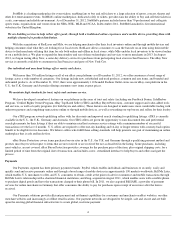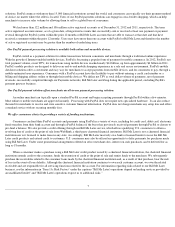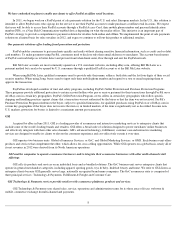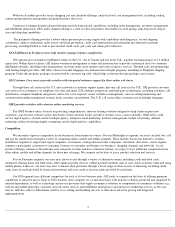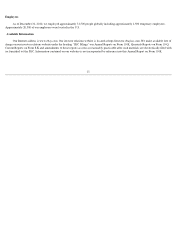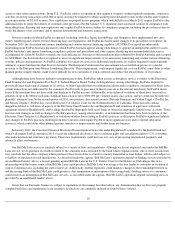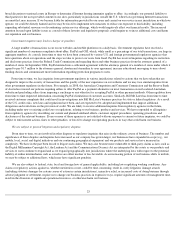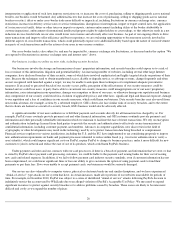eBay 2012 Annual Report Download - page 18
Download and view the complete annual report
Please find page 18 of the 2012 eBay annual report below. You can navigate through the pages in the report by either clicking on the pages listed below, or by using the keyword search tool below to find specific information within the annual report.
regulations and has significantly increased the resources of that program in the last several years, there can be no assurance that we will not be
subject to fines or other enforcement actions in one or more jurisdictions or be required to make changes to our business practices or compliance
programs to comply in the future.
While PayPal currently allows its customers with credit cards to send payments from approximately 190 markets, PayPal only allows
customers in 110 of those markets (including the U.S.) to receive payments, in some cases with significant restrictions on the manner in which
customers can withdraw funds. These limitations may affect PayPal's ability to grow in these markets. Of the markets whose residents can use
the PayPal service, 31 (27 countries plus four French overseas departments) are members of the European Union, or EU. Since 2007, PayPal has
provided localized versions of its service to customers in the EU through PayPal (Europe) S.à r.l. et Cie, SCA, a wholly-owned subsidiary of
PayPal that is licensed and subject to regulation as a bank in Luxembourg by the Commission de Surveillance du Secteur Financier (CSSF).
Accordingly, PayPal (Europe) is subject to significant fines or other enforcement action if it violates the disclosure, reporting, anti-money
laundering, capitalization, funds management, corporate governance, information security, sanctions or other requirements imposed on
Luxembourg banks. Any fines or other enforcement actions imposed by the Luxembourg regulator could adversely affect PayPal's business.
PayPal (Europe) implements its localized services in EU countries through a “passport” notification process through the Luxembourg regulator
to regulators in other EU member states pursuant to EU Directives, and has completed the “passport” notification process in all EU member
countries. The regulators in these countries could notify PayPal (Europe) of local consumer protection laws that apply to its business, in addition
to Luxembourg consumer protection law, and could also seek to persuade the Luxembourg regulator to order PayPal (Europe) to conduct its
activities in the local country through a branch office. These or similar actions by these regulators could increase the cost of, or delay, PayPal's
plans for expanding its business in EU countries. In addition, national interpretations of regulations implementing the EU Payment Services
Directive, which established a new regulatory regime for payment services providers in 2009, may be inconsistent, which could make
compliance more costly and operationally difficult to manage.
In 2011, we began implementing a new payment process in Germany and Austria in which eBay intermediated payments, receiving funds
directly from buyers for items purchased from newly registered sellers on the localized eBay websites in those countries and subsequently
paying the sellers upon shipment of the items. The German Bundesanstalt für Finanzdienstleistungsaufsicht (BaFin) and the Austrian
Finanzmarktaufsicht (FMA) subsequently determined that eBay was required to obtain a license in order to introduce the new payment method.
eBay's payment processing unit is based in Luxembourg and is governed by the CSSF, which had advised that there was no need for such a
license. In accordance with the BaFin and FMA positions, eBay has stopped intermediating payments and is working with the CSSF with respect
to understanding the requirements associated with obtaining an appropriate license.
In Australia, PayPal serves its customers through PayPal Australia Pty. Ltd., which is licensed by the Australian Prudential Regulatory
Authority as a purchased payment facility provider, which is a type of authorized depository institution. Accordingly, PayPal Australia is subject
to significant fines or other enforcement action if it violates the disclosure, reporting, anti-money laundering, capitalization, corporate
governance or other requirements imposed on Australian depository institutions. In China, PayPal is affiliated with Shanghai Wangfuyi
Information Technology Ltd., which is licensed as an Internet Content Provider and operates a payments service only for Chinese customers and
only for transactions denominated in Chinese currency. The People's Bank of China (PBOC) has enacted regulations to establish a new type of
license, called a Payment Clearing Organization (PCO) license, which will be required for non-bank payment services. The PBOC regulations
leave unclear whether a foreign-owned company such as PayPal can control or invest in a Payment Clearing Organization, and whether
Wangfuyi or PayPal's wholly-owned subsidiary in China would be eligible to obtain a PCO license. Nonetheless, PayPal applied for such a
license.
To date, PayPal has obtained licenses to operate as a money transmitter in 45 U.S. states, the District of Columbia and Puerto Rico. PayPal
is also licensed as an escrow agent in one U.S. state. PayPal is applying for money transmitter licenses in two additional states to facilitate its
planned offering of payment services at the retail point of sale. The two remaining U.S. states where PayPal has not applied for a license do not
currently regulate money transmitters. As a licensed money transmitter, PayPal is subject to restrictions on its investment of customer funds,
reporting requirements, bonding requirements, and inspection by state regulatory agencies. If PayPal were found to be in violation of money
services laws or regulations, PayPal could be subject to liability and/or additional restrictions, forced to cease doing business with residents of
certain states, forced to change its business practices, or required to obtain additional licenses or regulatory approvals that could impose a
substantial cost on PayPal. Any change to PayPal's business practices that makes the service less attractive to customers or prohibits its use by
residents of a particular jurisdiction could also decrease the velocity of trade on eBay and websites operated by GSI's clients that accept PayPal
as a form of payment, which would further harm our business.
16


